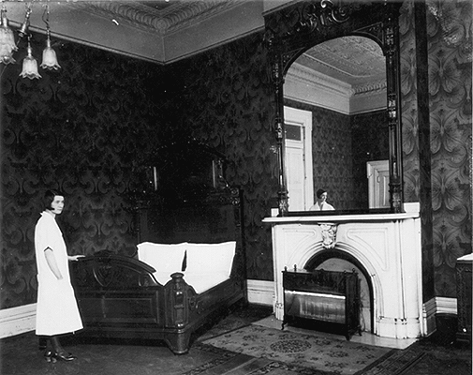

"Lincoln's Room Preserved," from Matches, publication of The
Palmer Match Co., Akron, Ohio, June 1935.
The wrecking crew began its work a few days ago on
one of America's celebrated hotels--the Monongahela House in Pittsburgh.
In the old days it was "grand" in the heavy carpeted, gold mirrored, fine
paneled way of the early 1800s. Abraham Lincoln stopped there on February
14, 1861, on his way to first Inaugural. He
made an address to
the people, who were curious, anxious and disturbed about political
conditions. From the balcony of his his room, the best room, called the
Prince of Wales room from the visit the year before of the future King
Edward VII, he looked on that unparalleled scene of industry: the iron
and steel mills pouring fountains of gushing gold into the night sky for
miles along the reflecting rivers. Incredible vistas of black and gold,
hill and river. So Abraham Lincoln saw Pittsburgh at night, and looked
down toward the Point where the
Monongahela met the Allegheny and formed the great Ohio flowing toward
the Mississippi and the sea.
Abraham Lincoln was interested in the Point and in those crowded wharves with the steamers from New Orleans, and the curious craft of the settlers moving always further west. Lewis and Clark had taken to little boats here on the first trip overland to the Pacific Coast. Audubon and his wife had taken boat here on their honeymoon into the west. Stephen Foster had lingered about these wharves to hear the songs of the Negro crews of Southern steamboats, and had caught their longing. And Abraham Lincoln, standing on that little balcony of his room, must have been reminded of his own trip down the Mississippi to New Orleans where he looked on the slave markets and made the long resolve.
His room, very naturally, became known as the Lincoln room. And as time went by, it was known as a very great honor when the hotel assigned celebrated guests to the Lincoln room. Among them were General Grant, and later several Presidents, and among the actors who cherished the privilege very deeply were Edwin Booth, and Sir Henry Irving, Salvini and others. Each, as he stepped out on that balcony, saw that incomparable scene of industry on the historic river. Each must have had thoughts of Abraham Lincoln, and the past, and the strange present and the future.
Now, the mills are electrified. Pittsburgh can no longer show visitors the scene so famous as "Hell with the lid off." Steel barges carry the coal. The rivers are made navigable by a series of locks and dams so that river traffic is uninterrupted through the year. The Civil War is long over, the World War has been fought. And again men are wondering at the strangeness of the times with its problems.
But times in our country always have been strange. In every generation the issues have been great. We change, we tear down, we rebuild. But there is something that we always keep.
The other day when the wrecking crew began to tear down the old hotel, most carefully they preserved of the Lincoln Room the furnishings, the carpets, the door and window frames, the hexagonal square-bordered oaken slabs of the flooring. The room is to be preserved in an historic museum of the city. It is Pittsburgh's most intimate keepsake of Abraham Lincoln.